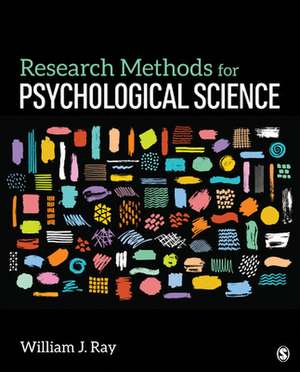Research Methods for Psychological Science
Autor William J. Rayen Limba Engleză Paperback – 14 noi 2021
Preț: 968.12 lei
Preț vechi: 1308.27 lei
-26% Nou
185.24€ • 193.93$ • 153.28£
Carte disponibilă
Livrare economică 17-31 martie
Livrare express 28 februarie-06 martie pentru 41.49 lei
Specificații
ISBN-10: 1544389442
Pagini: 480
Dimensiuni: 187 x 232 x 28 mm
Greutate: 0.85 kg
Ediția:1
Editura: SAGE Publications
Colecția Sage Publications, Inc
Locul publicării:Thousand Oaks, United States
Cuprins
About the Author
Introduction
Chapter 1 • What Is Science?
Learning Objectives
Science as a Way of Knowing
The Scientific Approach
Studying Behavior and Experience
Chapter 2 • Introduction to the Methods of Science
Learning Objectives
Naturalistic Observation
The Correlational Approach
The Experimental Method
Logic and Inference: The Detective Work of Science
Scientific Observation: The Raw Data of Science
Chapter 3 • Developing the Hypothesis
Learning Objectives
Making Our Hypotheses Concrete
Making Our Hypotheses Logical
Creating Testable Research Hypotheses and the Problem of Measurement
The Scientist’s Guide to Having an Idea
Tools for Library Research
Chapter 4 • Ethics
Learning Objectives
Ethical Considerations of Psychological Experimentation
Ingredients of the Initial Scientist–Participant Dialogue
The Rights of the Research Participant and the Responsibilities of the Experimenter
Deception Studies
Animals as Subjects
Chapter 5 • Description of Behavior Through Numerical Representation
Learning Objectives
Measurement
Measurement and Statistics
Measures of Central Tendency
Measures of Variability
Pictorial and Transforming Numerical Data
Measures of Association
Chapter 6 • Inferential Statistics: Making Statistical Decisions
Learning Objectives
Probability
The Normal Distribution
Hypothesis Testing
Chapter 7 • Testing the Hypothesis: A Conceptual Introduction
Learning Objectives
The Context of Experimentation: An Example
Types of Variation
Statistical Hypothesis Testing
Threats to Internal Validity
Conclusion
Chapter 8 • Control: The Keystone of the Experimental Method
Learning Objectives
Control Achieved Through Participant Assignment and Selection
Randomization
Control Achieved Through Experimental Design
Control as Related to the Logic of Experimentation
Chapter 9 • Applying the Logic of Experimentation: Between-Subjects Designs
Learning Objectives
Between-Subjects Design Terminology
Factorial Design
Factorial Designs: The Logic of Experimentation and the Interaction Effect
Chapter 10 • Extending the Logic of Experimentation: Within-Subjects and Matched-Subjects Approaches
Learning Objectives
Within-Subjects Designs
Mixed Designs
Matched-Subjects Designs
Chapter 11 • The Ecology of the Experiment: The Scientist and Research Participant in Relation to Their Environments
Learning Objectives
Ecology
Experimenter Factors
Subject Factors
Cultural and Social Bias
Chapter 12 • Quasi-Experimental, Correlational, and Naturalistic Observational Designs
Learning Objectives
Doing Research in the Real World: Closed and Open Systems
Quasi-Experimental Designs
Correlational Procedures
Naturalistic Observations
Chapter 13 • Single-Subject Designs
Learning Objectives
History of Single-Subject Designs
Case Study Designs
Experimental Single-Subject Designs
Alternative Types of Single-Subject Research
Chapter 14 • Questionnaires, Survey Research, and Sampling
Learning Objectives
Survey Question Construction and Formats
Methods of Administering a Survey
Sampling
Chapter 15 • Sharing the Results
Learning Objectives
Communication With Other Scientists: The Scientific Article
Publishing Your Article
Chapter 16 • Beyond Method
Learning Objectives
Dimensions of Research
Limitations to Finding Answers
Science as a Complex Human Process
Science as a Means of Transcendence
Glossary
References
Notă biografică
William J. Ray is an Emeritus Professor of Psychology at Penn State University. He received his PhD from Vanderbilt University and was a Fellow in Medical Psychology at the University of California Medical Center in San Francisco. He received his undergraduate degree from Eckerd College, where he learned about the value of primary sources and the need to integrate information from a number of perspectives. As part of his clinical training, he has worked in a number of mental hospitals and clinics across the country, where he developed an appreciation of the experiences of those with mental disorders. In his career, he has served as a visiting professor and researcher at the University of Hawaii, Münster University, University of Rome, Tübingen University, and Konstanz University. At Penn State, he was the Director of the SCAN (Specialization in Cognitive and Affective Neuroscience) program and was previously the Director of the Clinical Psychology Program. His research has focused on approaching clinical questions from a neuroscience perspective. He has used psychophysiological and brain imaging techniques such as EEG, MEG, DTI, and fMRI to study emotionality, psychopathology, and individual differences. These studies can be found in his numerous articles, book chapters, and books. His work has been published in such journals as Science, Proceedings of the National Academy of Sciences, Journal of Neuroscience, Psychophysiology, Physiological Reviews, Journal of Personality and Social Psychology, Developmental Psychology, Journal of Abnormal Psychology, Cognitive Brain Research, Biological Psychology, NeuroImage, and Clinical Neurophysiology. This work has been funded by both national and international agencies including NIH, NIMH, NASA, NATO, and the DAAD. In addition to research, teaching has been an important part of his career. His textbooks include Abnormal Psychology, Methods Toward a Psychology of Behavior and Experience, Psychophysiological Methods (with Robert Stern & Karen Quigley), Evolutionary Psychology: Neuroscience Perspectives Concerning Human Behavior and Experience, and Introduction to Psychological Science.
